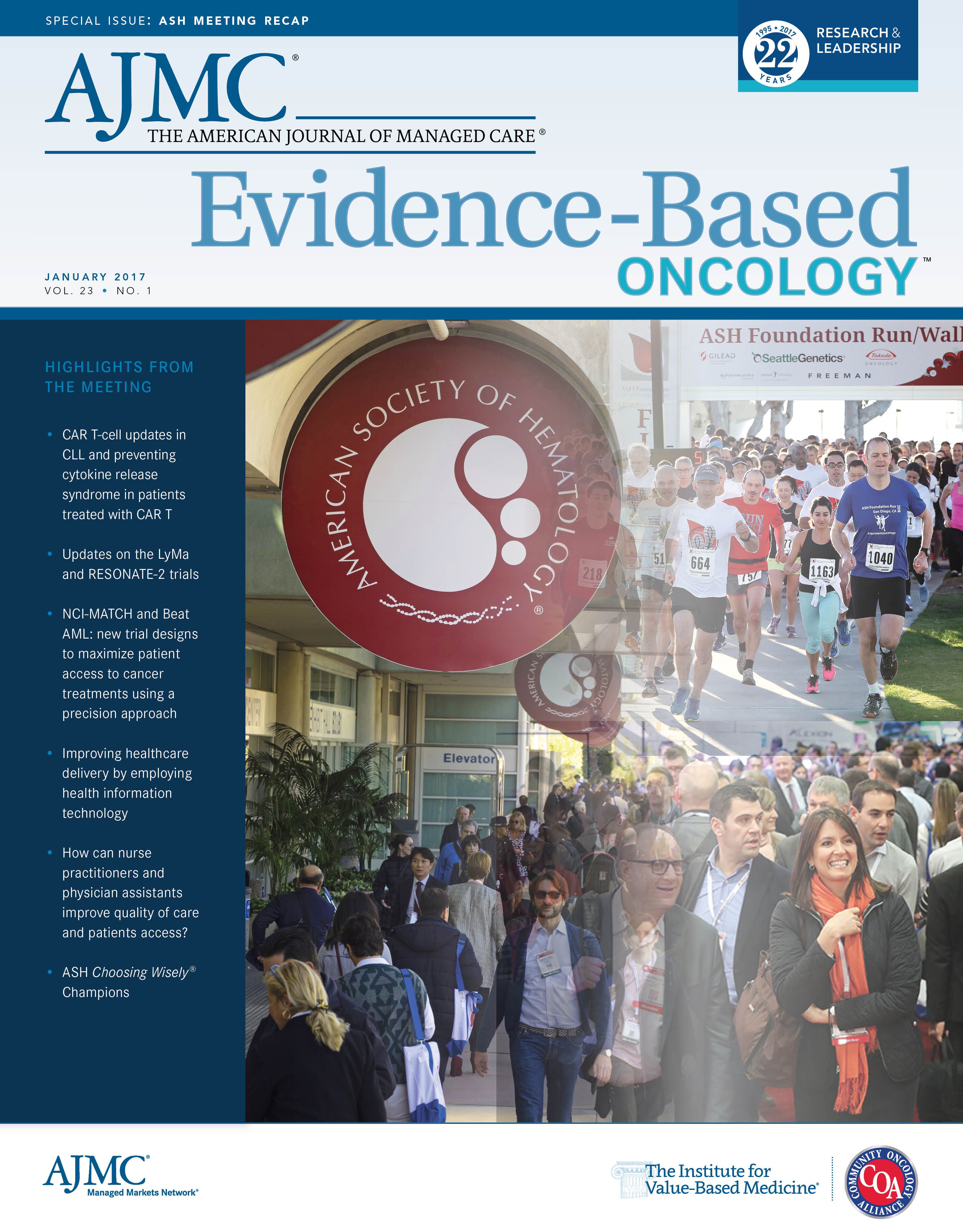- Center on Health Equity & Access
- Clinical
- Health Care Cost
- Health Care Delivery
- Insurance
- Policy
- Technology
- Value-Based Care
CAR-T Cells of Defined Composition Effective in Ibrutinib-Refractory CLL
In high-risk patients with chronic lymphocytic leukemia (CLL), CD19 chimeric antigen receptor (CAR)-T cells of defined composition can be administered with an acceptable early toxicity.
IN HIGH-RISK PATIENTS WITH
chronic lymphocytic leukemia (CLL), CD19 chimeric antigen receptor (CAR)-T cells of defined composition can be administered with an acceptable early toxicity. This was the conclusion of a study presented by Cameron J Turtle, MBBS, PhD, University of Washington, Seattle, during an early morning session on the first day of the 58th American Society of Hematology Annual Meeting & Exposition. Ibrutinib, a Bruton’s tyrosine kinase (BTK) inhibitor, causes partial responses (PRs) in a majority of patients with CLL. However, complete responses (CRs) are rare, and high-risk patients who progress on ibrutinib have short survival. Lymphodepletion chemotherapy followed by infusion of CD19-specific CAR-modified T cells has produced encouraging responses in CLL in phase 1 clinical trials, but the majority of patients in those studies had not previously received, or had failed, ibrutinib.
Describing the study population, Turtle showed that the study recruited 24 patients (median age 61 years; range, 40-73) who had received a median of 5 previous therapies (range, 3-9), including 4 patients who had failed prior allogeneic stem cell transplant. All 24 patients had previously been treated with ibrutinib—19 were ibrutinib-refractory, and 9 of these had a mutation in BTK or phospholipase gamma 2; 3 were ibrutinib-tolerant. Of the 24, 6 were venetoclax-refractory. Twenty-three patients had high-risk cytogenetics—16 had complex karyotype and 14 had a 17p deletion.
“We treated these 24 patients with CLL with anti-CD19 CAR-T cells that were manufactured from defined CD4+ and CD8+ T-cell subsets obtained by immunomagnetic selection of leukapheresis products,” Turtle said. The cells were formulated in a final 1:1 ratio of CD8+:CD4+ CAR-T cells, and infused at 1 of 3 dose levels (2x105, 2x106, or 2x107 CAR-T cells/kg) after lymphodepletion chemotherapy.
At the time of data cut-off, 23 patients had completed response and toxicity assessment; 1 patient had died prior to restaging. “Analysis of all patients with B-cell malignancies treated with cyclophosphamide/fludarabine and CAR-T cells on our trial showed that the highest dose level (2x107 CAR-T cells/kg) was too toxic for an initial CAR T-cell infusion and identified a maximum tolerated first dose of 2x106 CAR-T cells/kg,” Turtle showed. The toxicities listed in the table above were observed in the study.
Turtle told the audience that 6 patients who received JCAR024 immunotherapy had to be treated with tocilizumab and dexamethasone for the cytokine release syndrome (CRS) and/or neurotoxic symptoms. Two of the 6 patients received vasopressors and needed care in the intensive care unit; 1 patient died due to cerebral edema.
Fourteen out of 17 patients who were bone marrow-negative for disease had immunoglobulin heavy (IGH) locus sequencing performed. The analysis Cytokine Biomarkers Can Predict Response to CAR T-Cell Treatment in CLL Surabhi Dangi-Garimella, PhD found that the median progression-free survival was longer in IGHseq-negative versus IGHseq-positive patients.
CD19 CAR-T cells of defined CD4:CD8 ratio are highly active in CLL and can induce high response rates and durable CRs in poor prognosis patients who have previously failed ibrutinib. “We are working to discover serum biomarkers to identify how we can reduce neurotoxicity in patients who might be more susceptible and to provide an early intervention to prevent it,” Turtle said.
He concluded his talk by saying that in high-risk CLL patients—defined as 17p deleted, with complex karyotype, ibrutinib-refractory, or venetoclax-refractory—CD19 CAR-T cells of defined composition, such as JCAR014, can be administered with an acceptable toxicity profile. Further, “Deep marrow clearance by IGHseq following JCAR014 provides early signs of durable responses with 100% progression-free survival and overall survival,” Turtle said. REFERENCE
Turtle CJ, Hanafi L, Li D, et al. CD19 CAR-T cells are highly effective in ibrutinib-refractory CLL. Presented at: 58th American Society of Hematology Annual Meeting & Exposition; December 3, 2016; San Diego, CA. Abstract 56.


